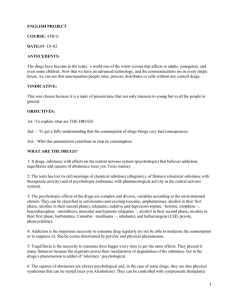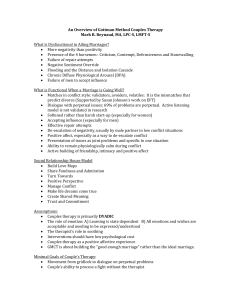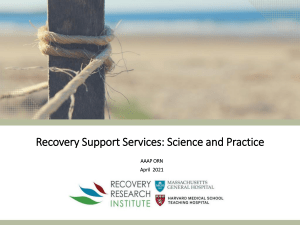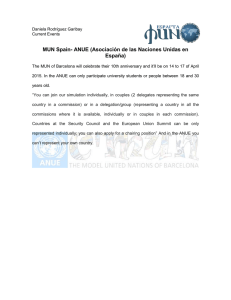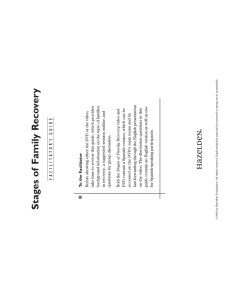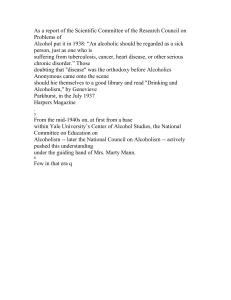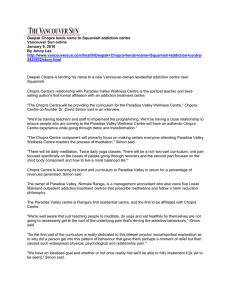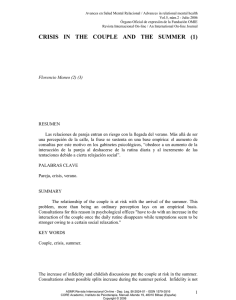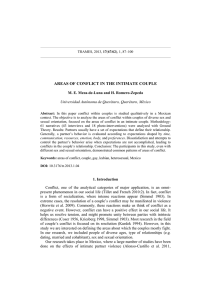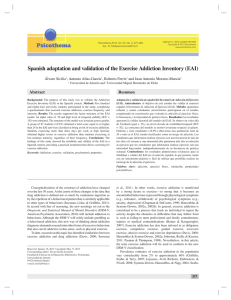Couple Recovery Development Approach
Anuncio
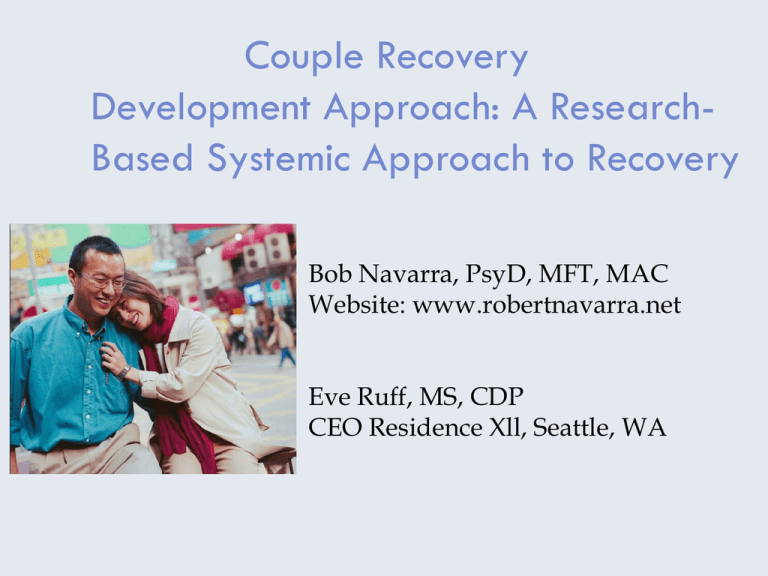
Couple Recovery Development Approach: A ResearchBased Systemic Approach to Recovery Bob Navarra, PsyD, MFT, MAC Website: www.robertnavarra.net Eve Ruff, MS, CDP CEO Residence Xll, Seattle, WA Addiction in Relationships Compared with couples without alcoholism: Separation & divorce rates are 4-7 times higher than in the general population Higher levels of distress and reported problems Higher levels of anger, hostility and negativity Decreased satisfaction in relationship Trouble with: boundaries, adaptability, feeling distant, communication, decision making, financial strain, parenting, and increased conflict Family Recovery Project (FRP) Sponsored by Mental Research Institute (MRI) in Palo Alto, California, the FRP began in 1989 Co-directors Stephanie Brown, Ph.D. and Virginia Lewis, Ph.D., sought to determine normal longterm recovery processes in family/couple relationship Three research components: a) Family Research Project; b) Curriculum Development, Maintaining Abstinence Program (MAPS); and c) Couples Focus Group Long- Term Recovery Study Humphreys, Moos, & Cohen, 1997. J. of Studies on Alcohol, 58,(3) 231-238 • • • • Short-term interventions have little long-term impact At the 8-year follow-up family relationship quality appears most predictive of remission Outpatient sessions sought in the first 3 years increased likelihood of remission at the 8 year mark AA participation in first 3 years increased likelihood of remission at 8 years Bio-Psycho-Social-Spiritual-Cultural Model of Addiction 5 Addiction as a brain disorder Dopamine hypotheses Genetic predisposition 89 genes are linked to addiction o Four fold higher incidence of alcoholism with positive history of alcoholism in family than in families without alcoholism than first-degree relatives of non-alcoholics o An estimated 25% -50% lifetime risk among sons and brothers of severely alcoholic men Designed by: Dr. Robert Navarra, MFT, MAC In collaboration with Drs. John and Julie Gottman and the Gottman Institute www.robertnavarra.net Welcome This research-based workshop is designed to help couples with the challenges of recovery from a relationship perspective. I’m right there in the room, and no one even acknowledges me." The Way Out: RECOVERY Individual Recovery Couple Recovery Often, treatment approaches neglect the couple relationship encouraging separate individual work only A relational approach considers three recoveries: each partner’s recovery and the relationship Addiction is Treatable Recovery Works Recent Data Show: Over 23.5 million people who identified have addiction problems now report being problem free. The 5 year mark of recovery is a “point of durability”, less than 15% relapse Healing Takes Time and Effort It’s normal to struggle after recovery The first year of recovery is crucial The couple is entering new territory It’s unclear how to now do things Old feelings mix with new feelings. This is normal What is the best path to take now? ? What do I need? How do I take care of me? What do I feel? How do I manage my relationship? What happens next? How do we handle things? Couples Need A Roadmap Based on: The Couple Recovery Development Approach, developed by Dr. Bob Navarra The Sound Relationship House Model, developed by Drs. John Gottman & Julie Gottman AND Bringing the Models Together Couple Recovery Goals 1. 2. 3. 4. 5. Begin to develop a recovery for the couple that also supports individual recovery Learn ways to manage emotions and change the way you handle conflict Work on boundaries and what healthy relationships need Learn to talk about addiction and recovery without blame Talk about goals for the future Couple Recovery Development Approach Time together and in recovery Unique Characteristics Life Cycle Shifting Intergenerational Reworking Attending Couple Recovery Development Approach 1. 2. 3. Shifting: Couples begin shifting away from the idea of approaching recovery as individuals to now include relationship recovery as an important part of individual recovery. Intergenerational Reworking: Couples begin to integrate a clearer understanding of the impact their families of origin have had on their own development as individuals and as partners in a couple relationship. Attending: Couples are able to attend to both the relationship and to their own individual needs. These are not mutually exclusive, which is often the case in active addiction. Secondhand Effects from Addiction Refers to the harmful impact of addiction - on society, family and significant others In an international analysis, the damage from alcohol world-wide is second only to tobacco Addiction treatment for significant others may overlook secondhand addiction and focus only on “codependency” Secondhand Addiction: Collateral Damage Living with active addiction is a balancing act affecting every part of the coaddict’s life. The harmful effects of this disease are not automatically a sign of codependency or of pathology. Secondhand addiction is associated with feelings of trauma, depression, anger and stress Defining Codependency: Behaviors like: 1. Manipulating and assuming responsibility for another’s problem use 2. Enabling continued drinking by protecting the other from the negative consequences of problematic use 3. Minimizing and Ignoring one’s own needs 4. Avoiding and discounting feelings 5. Low self-esteem related to perfectionism - often because of a history of being criticized and blamed Antidote: Remember the “Three C’s” When in a relationship with an addicted partner, remember: 1. 2. 3. You didn’t Cause it. You can’t Control it. You can’t Cure it. Otherwise: It feels like carrying the weight of the world Defining Interdependency in Relationships Focus includes self-care and relationship care A relationship where needs can be expressed and responded to without sacrificing one’s own health or well-being in the process Expectations include accountability to the partner and relationship between dependency with independence Concern for each other’s welfare and recovery Considering the longterm goals for the relationship Codependency vs Interdependency Are found in the differences in three different ways to manage and communicate reactions to your partner’s behaviors, and emotions Three Responses page 31 Codependent Interdependent Interdependent Roadmap for the Journey Day1: A Recovery Path for Couples Developing A Couple Recovery When Conversations Get Overwhelming Build Recovery Maps: Mine Yours Ours CPR for Our Recovery Develop New Rituals Roadmap for the Journey Day2: Healing from Addiction Managing Repair Aftermath of a Regrettable Incident Family of Origin Filters HEART – Healing Emotions from Addiction Recovery & Trauma Creating Vision Thank You for Participating Success is a journey, not a destination Ben Sweetland
